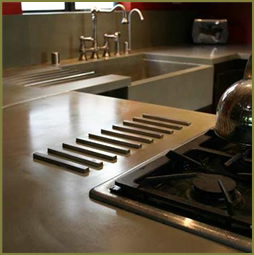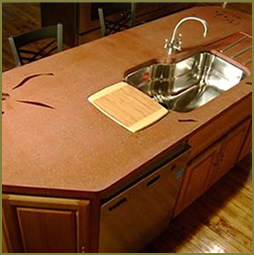Are Concrete Countertops Durable and How Do
You Maintain Them?
Answers to frequently asked questions about the durability of concrete countertops and how to maintain them properly

DeWulf Concrete
Are concrete countertops heat-resistant?
A common question posed about concrete countertops is if they can withstand heat. Overall, a concrete countertop is a durable, tolerant material. The issue lies with the sealer that is used on the concrete countertop. Every concrete contractor has their own preference for countertop sealers, so it is best to discuss with them what they use and how well it holds up to heat.
As a general rule, it is best to avoid placing hot pans on concrete countertops. It is likely there are sealers on the market that now provide protection from heat. But until you know which sealer will be used by your contractor, avoid placing hot items directly on the concrete countertop surface. Concrete is very heat resistant, but the concern is damaging or discoloring the sealer.
Using trivets of stainless steel, brass or copper are the best way to avoid damage to your sealer. Another one of concrete's versatile features is that you can embed a trivet(s) directly into the countertop, providing an easy access place for setting hot pans without the worry of doing any damage. You can also use hot plates or a hot pad on the counter, but embedded trivets are a unique and functional design option.
Do concrete countertops stain?
The most important factor to understand when it comes to concrete countertop's stain resistance is the type of sealer used. Any unsealed, natural state of concrete will stain because concrete is porous. In order for concrete to be used as a countertop material, it must be sealed. The good news is that there are a variety of concrete countertop sealers on the market, many of which can create a nearly impermeable surface that is highly tolerant and resistant to staining.
Concrete countertops are not a guaranteed non-staining surface. The concrete itself is virtually indestructible, but staining occurs when the sealer is compromised. This can happen when cutting, chopping or preparing food affects the sealer, or when a hot pan is placed directly on the sealer. Spills from juices, wine and other types of liquid typically do not affect the countertop surface when they are cleaned up quickly.
With a few precautions, concrete can be one of the most durable surfaces for countertops. It is best to talk with your concrete countertop contractor about how their countertops are sealed and how they can resist staining.
Do concrete countertops crack?
Miniscule, or what are referred to as hairline cracks, are nearly inevitable in a concrete countertop. They don't always occur, but they can develop. The cracks tend to be non-structural and are a result of the natural shrinkage of the concrete. It's important to understand how and why they occur in order to minimize or prevent them.
Common Cause of Cracks: Jeff Girard of Concrete Countertop Institute provides a great overview of the common causes of cracks. Most cracks are caused by the long-term drying shrinkage of the concrete. These are the most common type which are very small and relatively short. They are of no concern to the structural integrity of the concrete. In fact, more often, they are viewed as inherent characteristics of the concrete and not as flaws.
How to Prevent Cracks: Proper reinforcing when the concrete countertop is poured is the best way to reduce the likelihood of cracks. Out-of-level cabinets, improper supports, improper lifting and installation of the countertop can also contribute to cracks. It is wise to discuss how the countertop will be reinforced with your contractor for reassurance as to how they try to prevent significant cracking.
The possibilities of hairline cracks may be inevitable, but it's certainly not a reason to avoid concrete countertops. With some concrete countertop designs, it is these cracks specifically that are desired for creating a rich, worn-in appeal to the surface. It's realistic to expect the cracks, but, also keep in mind, that any unwanted minor cracks can be repaired and/or disguised.
Can you cut on concrete countertops?

Concrete Innovations
“Will my concrete countertop scratch?” – A common question is whether or not you can cut on a concrete countertop or will it scratch. Cutting on a concrete countertop won't hurt the concrete, but it can damage the sealer. This can affect the sealer's ability to keep out water and stains.
Because concrete countertops are a popular surface for kitchens and food prep areas, it's a reasonable question to ask. Cutting boards should always be used when chopping or preparing foods.
One creative option is to embed cutting boards into the concrete surface. Some contractors have devised embeds for removable cutting surfaces that protect the countertop, and still provide functionality to the food prep area.
How do you clean and maintain a concrete countertop?
Concrete countertops are really no different than any other type of countertop surface when it comes to cleaning and maintenance. A mild soap and warm water is recommended for daily cleaning. It is best to avoid using abrasive soaps, pads, or cleansers directly on the countertop, which could scratch or mar the countertop sealer. Find concrete product information here.
Some contractors recommend routine maintenance to include reapplying a wax to the surface of the countertop every month. Discuss this with your contractor as methods will vary. Regardless of how often you perform the recommended maintenance, the durability of your countertop will not be compromised.
Part of the appeal of concrete countertops is their natural ability to become worn with time and use. This can be prevented with a strict maintenance schedule, or you can allow your countertop to develop patina and character with use.

